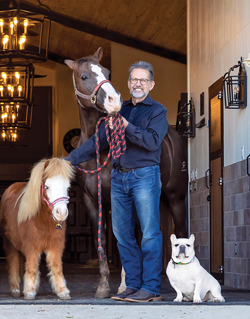
Q&A: Murtaugh aims to be 'visionary leader' for AVMA
This July in Denver, the AVMA House of Delegates (HOD) will elect the 2023-24 AVMA president-elect from among three candidates: Dr. Sandra Faeh Butler, 2020-22 AVMA vice president; Dr. Arnold L. Goldman, 2017-23 AVMA treasurer; and Dr. Robert Murtaugh, a former chair of the AVMA American Board of Veterinary Specialties.
In the following interview, Dr. Murtaugh explains why he's running and what makes him the best person for the office. The following responses have been lightly edited for length and clarity.
 Dr. Robert Murtaugh
Dr. Robert Murtaugh
Q: If elected, how do you envision your time as AVMA president?
A: I will see that time is spent in the traditional ways of being a spokesperson and ambassador for the AVMA and the profession. And I will expand that role to include a more significant portion of energy and effort focused on being a visionary leader for the advocacy and activism needed to ensure the health and wellbeing of the profession into the decades ahead.
Q: What makes you the best candidate for the position?
A: My professional leadership background, which includes clinical practice, ownership experience, academia, and the nonprofit and corporate sectors, gives me a broad perspective and the contacts to draw on for the collaborative approaches needed to solve our most pressing challenges.
Q: What do you see as the most immediate challenges facing the veterinary profession, and how can the AVMA address them?
A: We have several immediate challenges. Most importantly, we are in a workforce shortage, which will worsen unless the profession, led by the AVMA, takes a bold leadership approach. The shortage is the No. 1 issue affecting the wellbeing of our team members and access to care for our various stakeholder constituents. We need to grow and retain more veterinarians and veterinary technicians. We need to advocate for state and federal funding to increase veterinary college enrollments. We need to advocate for a more streamlined approach to bring licensable foreign veterinarians into the United States. We need midlevel providers. The AVMA needs to take a thoughtful and educated look, not reactionary, at creating that role in our profession to relieve the provider needs and increase access to care opportunities for our clients and other stakeholders. Similarly, we need to change the paradigm of our thinking and approaches to telemedicine and move to acceptance of establishing a valid veterinarian-client-patient relationship (VCPR) through the virtual as well as the in-person route.
Q: What's your perspective on wellbeing for the profession and how do you model wellbeing as a veterinary professional?
A: I believe our profession is under considerable stress, primarily for a reason mentioned previously: the workforce shortage. As leaders, we need to ensure our team members are led with empathy and care and are provided the tools and resources necessary to cope with the day-to-day stresses of the vocation. Additionally, as leaders, we must celebrate successes, recognize individual efforts, and reward our teams with gratitude every day. One needs to take care of oneself before being able to care for others. So, modeling self-care and providing counsel and opportunity to our teams on that front is also paramount.
Q: Talk about the importance of diversity, equity, and inclusion (DEI) in the profession and examples of how you have fostered DEI in your leadership career?
A: That is an excellent and highly important question. We need to foster DEI, as a profession we need to reflect the society we serve. As an individual, I am accepting of all people I encounter. As a leader, I have always promoted DEI throughout my career. I model that integrity by walking the walk as well as talking the talk, standing up to bigotry and intolerance and most importantly, calling it out.
Currently, my wife and I sponsor annual DEI scholarships at two veterinary schools: the University of Minnesota and Tufts University. I recently obtained an imaging residency for a young colleague who is wheelchair bound. Advocating for DEI is a core issue on my social media platforms, including support of the AVMA's DEI programs underway. I led the creation of the first veterinary technician specialty—emergency and critical care (ECC)—to support the growth opportunities for our co-professionals, the veterinary technicians. I am working on access to care for the financially disadvantaged as a board member for and donor to the Compassion Animal Project.
I was also recently appointed veterinary medicine academy chair for the National Academies of Practice (NAP). The goals and focus of NAP are to promote interprofessional collaboration and education including the topics of DEI. Additionally, a goal for the veterinary medical academy is to have the human-animal bond be recognized as part of the social determinants of health, allowing an avenue for access to basic veterinary care to become a right for all versus a privilege for some.
A version of this article appears in the June 2023 print issue of JAVMA.